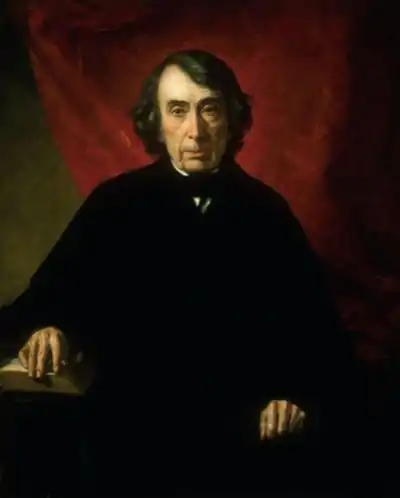TANEY, tâ-nĭ, Roger Brooke, American jurist: b. Calvert County, Md., 17 March 1777; d. Washington, D. C., 12 Oct. 1864. He was descended from a leading Roman Catholic family, was graduated in 1795 from Dickinson College, read law in Annapolis, began practice in 1799 and was immediately elected to the house of delegates as a Federalist. Defeated in 1801 and again in 1803, he returned to the practice of law. He was married in 1806 to Anne Phœbe Charlton Key, a Protestant, the sister of Francis Scott Key. Though a Federalist, he supported the government during the War of 1812 and was an unsuccessful candidate for Congress. In 1816 he was elected to the State senate. From 1815 to 1831 as one of Maryland's leading lawyers he was engaged in many of the important cases that came before the United States Supreme Court. After the break up of his party, he became a Democrat. In 1827 he was attorney-general of Maryland; and in 1831 was appointed Attorney-General of the United States and was the trusted adviser of Jackson. During the Bank controversy the Secretary of the Treasury refusing to remove the government deposits from the United States Bank, Taney, who had advised the removal, was transferred (1833) to the office of Secretary of the Treasury. He then removed the deposits and for this was fiercely criticised as being a “tool” of Jackson, the Senate in 1834 refusing to confirm his nomination, the first instance of the rejection of a Cabinet officer. In 1835 Jackson nominated him for associate justice of the Supreme Court, but again the Senate refused to confirm. In 1836 the personnel of the Senate having changed, Taney was nominated and confirmed as chief justice to succeed John Marshall, but not without strong opposition from Henry Clay and others. Taney at once showed tendencies toward strict construction and reversed several of Marshall's decisions. This angered the associate justices, some of whom threatened to resign. Taney was a strict constructionist rather than a States rights lawyer and judge. In the case of Prigg v. Pennsylvania the chief justice for the first time declared a State law unconstitutional. This was one of the “personal liberty” laws. In 1850, a similar law of Wisconsin was declared invalid. These decisions of the Supreme Court called forth States rights expressions from Northern legislatures. Taney's best-known decision was made in the Dred Scott case. The only point really decided was that Dred Scott was a slave, but the opinion of the court written by Taney also declared: (1) that negroes had not been regarded as citizens by the framers of the Constitution and hence could not become citizens of the United States nor have a standing in Federal courts; (2) that the Missouri Compromise was unconstitutional because Congress was bound to protect property, and the Constitution having recognized slaves as property, Congress was bound to protect slavery in the Territories. During the Civil War the Supreme Court ceased to have influence. Taney in the Merryman case (1861) denied the power of the President to suspend the writ of habeas corpus, and during the next three years opposed with no effect the arbitrary methods of the administration. As a lawyer, Taney never avoided the unpopular side. In 1811 he made himself disliked by defending Gen. James Wilkinson. In 1819 he defended a Northern Methodist minister indicted for inciting slaves to insurrection. During the trial of this case he said: “A hard necessity compels us to endure the evil of slavery for a time; yet while it continues it is a blot on our national character.” He emancipated his slaves, providing for their welfare. As chief justice, he brought system into the procedure of the Supreme Court which it had lacked under Marshall. Weak sight and bad health made writing difficult for him and the opinions of the court were usually written by one of his ambitious associates. He retained his mental powers to the last, in spite of wretched health. In person he was tall and thin, with an appearance of great physical weakness; in disposition quite, cheerful and studious, devoted to his family and friends. Consult Van Santvoord, ‘Sketches of the Lives and Judicial Services of the Chief Justice of the United States’ (1853); Tyler, S., ‘Memoir of Roger Brooke Taney’ (1876). Taney wrote an autobiography, which ended with 1801 and forms chapter I of Tyler's Memoir.
 |
ROGER BROOKE TANEY
Chief Justice of the United States Supreme Court, 1836-1864